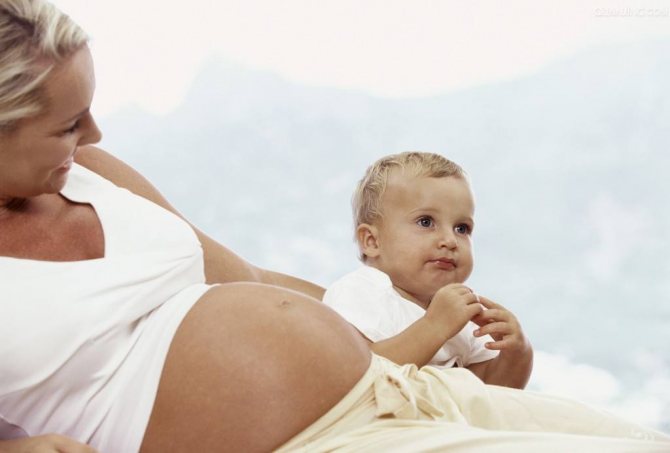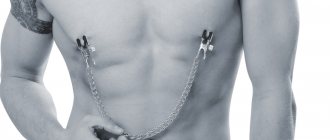Probability of pregnancy during lactation
Modern gynecologists answer the question about pregnancy during lactation in the affirmative. After the birth of a baby, a woman’s body needs time to recover. This also applies to reproductive function. In most cases, breastfeeding greatly affects the functioning of the ovaries, or rather, this effect is exerted by the hormones oxytocin, which is responsible for the flow of nutrient fluid to the ducts, and prolactin, which is responsible for the production of breast milk. It is prolactin that inhibits the maturation and release of the egg from the ovary: ovulation does not occur, which means pregnancy does not occur. This method is called lactational amenorrhea, but doctors insist that it is not effective and in many cases conception still occurs.
According to statistics, about 4% of women can become pregnant within two to three months after childbirth, as soon as postpartum bleeding - lochia - ends. The resumption of ovulation largely depends on the individual characteristics of the female body, so egg maturation can occur even during breastfeeding.
The lactational amenorrhea method is not an effective way to protect against unwanted pregnancy.
Some nursing mothers think that conception is impossible until menstruation has resumed. This is also a misconception. The fact is that ovulation occurs first, and only then, if fertilization has not occurred, menstrual bleeding begins. Therefore, pregnancy is possible even before the start of menstruation. Gynecologists recommend thinking about contraception from the moment you resume sexual intercourse after childbirth, i.e. two months after the birth of the child. To do this, you can sign up together for a consultation with a doctor, who will select an effective remedy that suits both partners.
If young parents are consciously planning another pregnancy, then they can refuse to use contraception. However, doctors warn: the female body needs rest and time to recover. Therefore, the optimal difference between childbirth and the second pregnancy is two to three years.
If a married couple has chosen protection using the lactational amenorrhea method, then you should know that its effectiveness depends on many nuances and this method can only be used in the first six months after the birth of the baby. However, there are some factors that increase the likelihood of getting pregnant:
- The baby is put to the breast according to the schedule. Those. the nursing mother chose this particular method and feeding on demand is unacceptable for her. In case of irregular stimulation of the nipples, the body produces less prolactin, so ovulation can resume;
Also, the risk of conception increases if the baby is not put to the breast at night. After all, it is in the dark that the hormone prolactin is formed in greater quantities. If there are no night feedings or the interval between feeding the baby to the breast is more than four hours, the functioning of the ovaries can be restored.
- the baby is supplemented with a special adapted mixture or supplemented with water;
- the use of feeding bottles and pacifiers is also a risk factor. The fact is that up to six months, babies have an innate sucking reflex. If the child satisfies it with the help of, for example, a pacifier, then he will not actively and often ask for the breast. After six months, the sucking reflex gradually fades away.
Provided that the child is exclusively breastfed, menstruation resumes on average eight to twelve months from the date of delivery. However, cases when menstruation begins two years after childbirth are considered a variant of the norm. But if young parents do not plan to have another baby in the near future, they should not neglect contraception.
Video: is there a chance of getting pregnant if your periods have not yet returned after childbirth?
Symptoms during breastfeeding
With the onset of pregnancy, a woman’s body always gives signals that colossal changes have occurred and now there is another main task - to bear the fetus. However, many young mothers do not even know they are pregnant. The fact is that after childbirth and during breastfeeding, hormonal changes occur. Constant care for the baby also plays an important role, as the mother’s extreme fatigue affects her. Therefore, most women attribute early signs of pregnancy to fatigue and overexertion.
It is worth noting that after childbirth, the body’s priority task is to produce milk to feed the baby. However, if conception has occurred and the embryo has settled in the uterus, priorities change: the first place is taken by the task of bearing the fetus, and only then by breastfeeding the older child.
Gynecologists recommend listening carefully to your feelings, monitoring the condition of the body as a whole, and not ignoring some symptoms. Signs of pregnancy during lactation are:
- absence of monthly bleeding. If a young mother has already resumed her menstrual cycle and her period does not come on time, this is a reason to take a pregnancy test. But even if menstruation had never occurred since the moment of delivery, conception could have occurred;
- change in sensations when the baby is attached to the breast. Some women feel pain during feeding, especially in the tender nipple area. Sometimes a nursing mother simply cannot continue breastfeeding due to severe pain;
- swelling of the mammary glands, breast hardening. This condition occurs due to a surge in hormones due to pregnancy;
- a sharp change in gastronomic preferences, a strong reaction to odors;
- feeling of nausea, sometimes vomiting is possible;
- unusual sensations in the lower abdomen, in the area of the uterus. Most often, women experience a feeling of heaviness or contractions of the reproductive organ, especially while breastfeeding their first baby;
This is the effect of the hormone oxytocin: it not only promotes the release of breast milk from the nipples, but also affects the contractility of the reproductive organ.
- unusual behavior: sudden mood swings, emotional stress, tears;
- fatigue and constant desire to sleep;
Most young mothers never take this sign of pregnancy into account, because when there is a baby in the family, sleepless nights and constant fatigue are normal for young parents.
- the baby suddenly begins to behave unusually: the baby refuses the breast, is capricious, does not want to latch onto the nipple, while he is hungry and wants to eat. In some cases, the child may independently refuse to breastfeed and the woman has no choice but to transfer the baby to artificial feeding.

Women simply do not notice many of the symptoms of pregnancy during breastfeeding, so they find out that they are carrying another child quite late.
What effect does pregnancy have on lactation?
Restructuring and hormonal surge in the body begins from the first days after conception. The fertilized egg attaches to the inner surface of the uterus and the body assigns itself the main task of bearing a fetus. If a young mother decides to take a pregnancy test, she can get a reliable result within seven to ten days from the moment of conception. In the case when a young mother decides to continue the pregnancy and give birth to another baby, the most pressing question that worries her is how pregnancy will affect the lactation process.
Doctors have proven that for a baby during the first twelve months of life, mother's milk is the best nutrition, which is rich in vitamins, minerals and beneficial elements. Therefore, most nursing mothers try to maintain breastfeeding even during the next pregnancy.
Gynecologists and breastfeeding consultants warn nursing women that the new state of the body has a significant impact on the lactation process:
- the texture of the nutritional fluid changes: mother’s milk becomes thicker than usual;
Very often, it is for this reason that the child begins to be capricious during feeding, because getting food becomes much more difficult: the baby requires more effort while sucking.
- The taste of breast milk changes. Very often, children simply refuse to breastfeed because they no longer like the taste of the valuable liquid. Therefore, the mother has no choice but to transfer the baby to formula;
- Mother's milk becomes significantly less. Most often this occurs from the beginning of the second trimester of pregnancy. The baby simply does not have enough nutrition, so he needs to be supplemented with formula (mixed nutrition).
Signs of pregnancy during lactation: how mothers realized that they were carrying a child
I felt bad after eating in the sanatorium cafeteria, I thought the food was not suitable.
Olga Olga
https://deti.mail.ru/forum/v_ozhidanii_chuda/beremennost/beremennost_vo_vremja_grudnogo_kormlenija/
Taste preferences have changed. I wanted squash caviar with green (fresh) peas, and all sorts of other similar nonsense.
Chuck! (Chupa Chups with onion flavor)
https://deti.mail.ru/forum/v_ozhidanii_chuda/beremennost/beremennost_vo_vremja_grudnogo_kormlenija/
I got pregnant twice with breastfeeding. Apart from the delay, there were no signs; toxicosis began later.
PUNK IN THE SHOWER
https://deti.mail.ru/forum/v_ozhidanii_chuda/beremennost/beremennost_vo_vremja_grudnogo_kormlenija/
None. There was no cycle. Discovered in the sixth month by kicking. Compared to the first one, I felt like heaven and earth, simply magnificent. After stopping feeding (the last 3 months of 2 pregnancies), milk stubbornly did not give up.
Flynx
https://deti.mail.ru/forum/v_ozhidanii_chuda/beremennost/beremennost_vo_vremja_grudnogo_kormlenija/
My son began to look at me strangely while feeding)) apparently, the taste of the milk had changed and the nipples became painful.
SweetKa
https://www.babyblog.ru/community/post/Mnogodet/3140691
From personal experience of nursing mothers
I decided to slowly wean off. I'll leave only night feedings for now. During the day we slept wonderfully with a bottle. I'm afraid that my body is not strong enough to cope with a triple load. And the doctor actually said that the little one had to give up the breast herself, because... The milk should already be tasteless.
Titmouse
https://www.komarovskiy.net/forum/viewtopic.php?t=3289
A friend of mine did not stop feeding her son when she was pregnant with her daughter and then continued to feed her in tandem... It was scary to look at her: her hair came out, her nails peeled, she lost her teeth.
None of your business
https://deti.mail.ru/forum/v_ozhidanii_chuda/beremennost/beremennost_pri_gv_1391487794/
I became pregnant during breastfeeding, but when I was 9-10 weeks old, my daughter refused to breastfeed on her own. Back-to-back pregnancies are very hard on the body! Even though I stopped feeding my daughter, my teeth and hair were falling out, no vitamins can help, so it’s better to listen to the gynecologist and stop feeding her, especially since at 8 months many foods have already been introduced into the diet, so with will not die of hunger.
Yatokisa Yatosuka
https://deti.mail.ru/forum/v_ozhidanii_chuda/beremennost/beremennost_pri_gv_1391487794/?page=2
My weather is 1.2 years apart. You can breastfeed if there is no real threat of miscarriage. The number and volume of feedings are unlimited. Nature arranges it in such a way that the tummy gets everything first, the mother second, and the rest goes to the eldest. I thought about tandem feeding, but it didn’t work out. The fact is that towards the end of pregnancy, soreness in the nipples begins, and while carrying our first child we don’t really notice it. Plus, milk turns into colostrum. I have very strong pain sensitivity. In general, the tummy was 7 months old when the eldest refused to breastfeed. Now I regret it, she began to sleep poorly at night, she drinks 5 bottles.
July
https://puzyaka.ru/forum/showthread.php?t=6165
Breastfeeding during pregnancy: what awaits the elder
Mother's milk always remains a unique and valuable, optimally suitable and balanced food product for the child. This value is especially undeniable in the first six months of life, when the baby’s gastrointestinal tract is not yet adapted to properly digest other types of food. The trouble is that, against the background of hormonal changes associated with the mother’s new pregnancy, the milk may acquire an unusual and unpleasant taste for the baby, and then the little one may independently abandon the breast. It is unnecessary to explain that in this case it is impossible to do without transferring him to artificial feeding. But this is only one of the possible options for the development of the situation, and it does not always occur. Of course, the age of the child and his state of health play an important role in deciding whether to feed or not feed. It is especially undesirable to deprive a baby of natural feeding if he was born premature or immature, has received or is receiving antibiotics, is lagging behind in physical and/or psychomotor development, if he has a tendency to allergic diseases or pathologies of the gastrointestinal tract (obvious problems or hereditary predisposition ), symptoms of rickets are noted. It would be good to extend the period of breastfeeding for all healthy babies to at least six months.

The main question: is it possible to continue breastfeeding?
Modern medicine does not give a clear answer to the question: is it possible to breastfeed a child during pregnancy? A lot depends on the individual characteristics of the young mother’s body, as well as on the course of pregnancy. However, most doctors still recommend weaning the baby from the breast during pregnancy. They explain that during nipple stimulation, oxytocin promotes the flow of milk into the ducts and the release of it from the mammary glands, while at the same time a surge of this hormone affects the uterus, causing it to contract. This can lead to spontaneous abortion.
However, if a nursing mother has decided to complete lactation, doctors do not recommend doing this earlier than twelve weeks of pregnancy. The fact is that sudden hormonal changes also increase the risk of miscarriage.
However, the final decision: to continue breastfeeding or transfer the baby to formula depends on a combination of many factors. If a woman does not have a threat of termination of pregnancy, the obstetrician-gynecologist does not recommend abruptly weaning the baby from the breast, the baby does not refuse to latch onto the nipple, and most importantly, the young mother wants to continue breastfeeding the baby, which means there is no need to deny the baby breast milk.
Experts warn: the body is under increased stress, giving a large amount of vitamins and nutrients to the unborn baby, and many necessary elements go into breast milk for feeding the first baby. Therefore, doctors recommend supporting the body: eating a balanced diet and be sure to take a complex of special vitamins for pregnant and lactating women.
The famous pediatrician Evgeny Olegovich Komarovsky is of the opinion that breastfeeding can be continued during pregnancy, but only if the gynecologist observing the expectant mother does not see the need to complete breastfeeding, and also if the woman herself wants to continue breastfeeding her older baby.

Whether or not to continue breastfeeding during pregnancy depends on the woman’s wishes, the doctor’s recommendations and the characteristics of the gestation period.
Don’t take risks: in what cases is it better to stop feeding?
There are times when nothing depends on a woman’s desire. At the appointment, the doctor categorically prohibits continuing breastfeeding, because... this process is a threat to the health and life of the unborn baby. Each body perceives this situation differently, so it is impossible to accurately predict how lactation will affect pregnancy.
Modern young mothers do not always trust doctors. They are ready to search for information using Internet sources and consult with friends and acquaintances. Therefore, it happens that the recommendation to wean the child from the breast remains only the advice of a doctor, and the woman does not listen to the words of the specialist. She motivates her decision by saying that she feels great and does not see the need to stop breastfeeding. This is a big mistake, because the gynecologist conducts a comprehensive examination and only based on the results determines whether there is a risk to the fetus if breastfeeding continues. You should not risk the life of the unborn baby; you must carefully follow the instructions of the female doctor.
Doctors identify cases when breastfeeding must be stopped:
- a young mother experiences severe pain while putting her baby to the breast. During pregnancy, the sensitivity of the nipples increases, which is why the woman feels pain. If the situation does not return to normal, you should not continue breastfeeding; it is better to gradually end lactation and transfer the baby to formula;
Children often refuse to breastfeed on their own: they behave capriciously during feeding and do not want to latch onto the nipple. There is no need to force a child, this will not lead to a positive result.
- the mother experiences psychological discomfort during breastfeeding. It happens that a woman suddenly begins to feel hostility or disgust when she puts the baby to her breast. Doctors insist: you shouldn’t go against your feelings, the baby needs a cheerful and happy mother. Therefore, if the mother does not want to continue lactation, you need to listen to the feelings of your own body;
- if the expectant mother has a history of miscarriages or premature births, gynecologists advise stopping breastfeeding to reduce the risk;
- during the examination, the doctor diagnosed cervical incompetence (a situation where there is a threat of cervical dilatation, which will lead to premature birth);
- According to the examination results, there is a risk of pregnancy. If the period of gestation occurs with complications, gynecologists try to eliminate all risks, in this case breastfeeding is one of them;
- An ultrasound showed a multiple pregnancy. In this case, very often obstetricians recommend transferring the older baby to artificial nutrition. After all, bearing two or more children is a very difficult task, so additional risks must be eliminated.
However, if the unborn child is not in danger, and the mother and baby are determined to continue lactation, then doctors are not against continuing breastfeeding. Some women give birth to another baby and feed both children in tandem.
Should you stop breastfeeding before giving birth?
Modern gynecologists do not give clear recommendations on this matter. Most often, doctors advise focusing on the following nuances:
- baby's age. If the older child is more than one and a half to two years old, then you can gradually wean him off the breast. This must be done a month and a half before the expected date of birth. At this age, the baby eats solid food, so he no longer feels a great need for breast milk;
If the baby is not yet a year old, then lactation can be continued, and after the birth of the second baby, both children can be fed in tandem.
- child's behavior. Very often, children themselves refuse to breastfeed closer to the date of birth. The milk changes its consistency: it becomes more like thick colostrum, and the taste of the nutritional fluid also changes. If the baby is ready to give up breastfeeding, then the mother can only listen to her baby;
- a mother’s opinion on the ability to feed two children at once. In fact, it is very difficult to feed both at once. Therefore, if a woman decides for herself that this option does not suit her, you can wean your first baby from the breast a few weeks before giving birth.
Some gynecologists have come to the consensus that it is necessary to begin to complete lactation after the twenty-second week of pregnancy, so that before childbirth the body does not experience the burden of milk production. However, the issue is resolved individually in each specific case.
Video: doctor’s opinion on lactation during pregnancy
Pregnancy and lactation Weaning
The minimum gap between pregnancies should be two years. During this time, the female body will be able to get stronger, restore reserves of vitamins and minerals spent on bearing a child and breastfeeding . For the time being, nature will take care of postpartum contraception. The first 3-4 months from conception are protected by lactational amenorrhea - the body’s ability to suppress ovulation during breastfeeding. Then this mechanism will begin to malfunction, and additional protective measures will be required. But sometimes pregnancy still occurs before the young mother weans the baby from the breast. What to do in this case? Let's try to look at the situation through the eyes of all participants in the process. There are three of them - the eldest child, the youngest and one mother between them.
Pediatrician's opinion
During a new pregnancy, lactation itself does not stop, and milk continues to be as necessary and beneficial for the growing child as before. The amount of nutrients and protective factors in it is optimal for the baby. However, as pregnancy hormone levels increase, the amount of lactose in milk decreases and the amount of sodium increases, which changes the taste of the product. This is where the belief comes from that pregnant woman's milk becomes bitter. It would be more correct to say that it ceases to be sweet. It is possible that the baby will not like the new taste, and he himself will refuse the breast. You need to be prepared for such a turn of events. There is also no need to worry that, contrary to the mother’s plans, the baby will have to be transferred to adapted formulas ahead of time.
The second danger is that 70% of women who become pregnant during lactation have less milk. The child does not have enough food, and cannot do without portions of artificial milk and complementary foods. Don't be upset, everything is for the better.
Gynecologist's opinion
During pregnancy and lactation, the female body experiences enormous stress - physical, mental, hormonal. There is a complex restructuring of the work of all organs and systems.
If a question arises about the combination of pregnancy and breastfeeding , you need to weigh your options and consult with your doctor. He can prescribe tests and tests to determine the body's resources. Many factors are important: the age of the pregnant woman, the characteristics of the previous and current pregnancies, the gestation period, the psycho-emotional development of the already born baby.
There are other risk factors. When a baby suckles at the breast, the hormone oxytocin is produced, which stimulates uterine contractions and could theoretically trigger miscarriage. And here the opinions of experts are divided. Some say that practice shows there is no risk: the uterus is immune to oxytocin until 20 weeks of pregnancy, which means there is no threat of miscarriage. If the woman is healthy, then oxytocin even after this period does not cause uterine contractions, which can lead to premature stimulation of labor. Any sexual activity gives a similar resonance, but most couples do not stop intimate intimacy during pregnancy , and it is not interrupted because of this.
Other gynecologists believe that there is still a danger, and therefore feeding during pregnancy can lead to complications. This is especially true for women with fibroids, threatened miscarriage, and a history of spontaneous abortions. If special medications are required to maintain pregnancy, the situation will generally reach a dead end. Many of the medications are incompatible with breastfeeding because their ingredients (hormones) are contraindicated in infants.
The supporters of these different points of view did not come to a consensus, but developed a common strategy of behavior. According to it, breastfeeding should be completed in the second trimester of pregnancy, after 22 weeks. Special rules should be followed during Braxton-Hicks training contractions if they occur during feeding. It is better to interrupt the baby's meal, drink water, straighten your legs, and after that you can feed the baby a little more. The main thing is not to prolong the session, which is accompanied by training contractions.

Feeding during pregnancy: diet
If, after consulting with your doctor, you are convinced that you can continue breastfeeding, you will need to reconsider your diet. A breastfeeding pregnant woman should eat approximately the same as if she was expecting twins. This is especially important for women suffering from toxicosis in the first trimester of pregnancy . Nausea and vomiting limit the menu, reducing the diet to a minimum. Useful substances have to be divided among three participants in the process, and each gets very little. First of all, the body provides for the unborn baby, then lactation, and only then feeds the mother.
Poor nutrition will affect the development of children. Both may develop vitamin deficiency and related disorders. A decrease in hemoglobin in a woman’s blood can result in iron deficiency anemia in her and chronic hypoxia in the youngest toddler. To ensure that your nutritional reserves are regularly replenished, you need to monitor your menu. This is especially important in the last three months of pregnancy, when the youngest child is growing rapidly. There is no need to eat for three; the quality, rather than the quantity, of food consumed is much more important. It is better to eat not in very large portions, but often, and to drink as much as you want, no more and no less.
Feeding during pregnancy: pros and cons
Experts in natural feeding defend their point of view at all costs, advocating continued feeding during pregnancy right up to childbirth. The ideal, in their opinion, is this option: feeding is interrupted for childbirth, but after returning from the maternity hospital, the mother begins the process again, placing two toddlers at the breast. In foreign literature on breastfeeding, this method is called tandem. If the difference between children is no more than a year, then this scheme should be considered as feeding twins. Meals can be shared - each baby suckles at his own breast - or in turns. The youngest child should be allowed to go ahead. In order to have enough milk for two, you need to empty both breasts at each feeding. There is no need to take a break, even if one of the babies is sick: the milk produces antibodies to the causative agent of the disease, which will help one baby recover and the other not to get sick.
Tandem has advantages. One of them is excellent breast condition. When starting to feed a newborn in the maternity hospital, a woman will not suffer from engorgement, sudden influxes of milk or lack of milk - the baby will immediately receive as much food as he needs for normal development, and even in excess. He will not have to make any effort, milk will literally pour into his mouth - the milk ducts in the developed breast are filled instantly. There should also be no painful cracks in the nipples, but still make sure that the youngest child takes the breast correctly.
However, breast problems will still appear. Due to pregnancy, she will become very sensitive and the nipple area will become painful. This condition does not require any treatment. Perhaps by the second trimester of pregnancy the hormonal levels will change and the pain will disappear, but this cannot be promised.
The second argument in favor of the tandem is psychological. Weaning a baby if he is not ready for it can be stressful. And the appearance of a rival toddler in the family, who will “get” his mother’s breast, will only intensify the experience. Watching how the mother's breast - a symbol of love and protection - is used without restrictions by someone else and as yet unknown, the baby may feel abandoned, deprived and useless to anyone. Which will be reflected in his behavior. The baby will become capricious, eat poorly, sleep poorly, and may even get sick.
A mother who feels guilty because her poor judgment led to a new pregnancy and weaning of her eldest may become depressed. This will lead to psychological tension in the relationship between “mother and older child” and “elder child and younger child” with far-reaching consequences. But if, upon returning home, the mother masters tandem feeding, both babies will receive their portion of milk and tenderness, and such problems will not happen.

How to wean
If, nevertheless, a decision is made in favor of refusing to feed, then the baby must be weaned from the breast gradually. If medical indications are favorable, it is better to do this no later than 1.5-2 months before birth. It is believed that during this time the older child will have time to forget about his mother’s breast and will not suffer if a younger brother or sister takes possession of it.
First you need to eliminate daytime feedings, replacing them with mixtures or complementary foods. The first morning, evening and night feedings should be the last to go. Switching to a new diet can be complicated for various reasons. For example, the mixture will cause allergies in the baby. At the first sign of trouble, it must be replaced.
It is possible that the baby is not satisfied with the taste of the mixture - offer another, a third. Some toddlers are happy to switch to fermented milk products. If the baby is already more than six months old, you can dilute a little baby puree in it to improve the taste of the mixture. There may be this option: the child will not like to drink milk from a bottle with a nipple. Try replacing it with a special spout attachment. Do not forget that after replacing breast milk with artificial analogues, the baby must be supplemented with water.
If you put your baby to your breast less and less often, the milk will subside on its own. If this does not happen, then drugs that reduce lactation will be required.
You may be interested in the articles “Breastfeeding after cesarean section” and “How long to breastfeed?” on the website 2mm.ru
Permitted methods for stopping lactation
If a nursing mother decides to end lactation during pregnancy, then first of all it is necessary to consult a doctor. Not all means and methods of stopping breastfeeding are allowed during pregnancy, so as not to harm the health and development of the unborn child.
It is strictly forbidden to make decisions on your own and use a certain method of weaning the baby from the breast. Even seemingly harmless decoctions or infusions of medicinal plants can negatively affect pregnancy.











